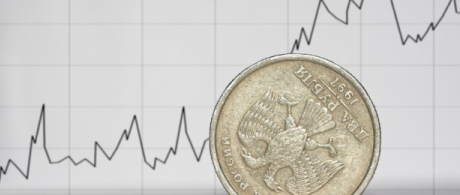
Published 22-11-2012, 10:37
 On November 22, the Russian Government is to discuss scenarios of macroeconomic development of Russia until the year 2030 prepared by Deputy Minister of economic development Andrey Klepach after his participation in the Valdai Club annual summit. The main idea of the project is to cut the distance between Russia and developed countries. Particularly he thinks that inflation will keep on 5% rate and GDP growth will be 4.1-5.4% per year. Andrey Klepach shared with the valdaiclub.com what tips from the Valdai Club experts had become a valuable addition to his project.
On November 22, the Russian Government is to discuss scenarios of macroeconomic development of Russia until the year 2030 prepared by Deputy Minister of economic development Andrey Klepach after his participation in the Valdai Club annual summit. The main idea of the project is to cut the distance between Russia and developed countries. Particularly he thinks that inflation will keep on 5% rate and GDP growth will be 4.1-5.4% per year. Andrey Klepach shared with the valdaiclub.com what tips from the Valdai Club experts had become a valuable addition to his project. The main topic of this conference is Russia's economic development until the year 2030. What recommendations given by the participants of the conference could be useful for the future work of the Russian government?
This may not be concrete recommendations, perhaps, but the general discussion between important economic institutions. Really, this is one of the key factors of economic growth, from the point of view of the investment climate. But at the same time, there are other institutional factors as well, which are also very important for the competitiveness of our country. One concern has to do with structural change in the economy. Another concern is the desire, the political desire, to implement strategy decisions that were made in the economy, or in other spheres. So maybe the issue is not just one of institutional will, but also political will, a strategic approach, when we think not only about today, but also about the more long-term future.
Valdai Club discussion offers a very interesting and different view of the potential for growth and competitiveness of different sectors of the Russian economy, such as the agricultural sector or education, including its competitiveness on a global scale and its potential for export on the foreign market, for example. On the other hand, very interesting to me was Piotr Dutkevich's point that all great crises generate great ideas, as was the case with the Keynesian ideas after the Great Depression. This great crisis, the deep crisis of 2009 or 2010 has not yet generated any principally new ideas. It really created some lacunas and also a challenge for all sides, or political leaders, to generate a new agenda from the point of view of economic policy.
You were talking about the crisis. In the context of today's global events - is it a prospective strategy for the 20-year long term of pressing need for our economy, and for an economy in general?
I really think that a strategic view is very important, because we need to think not only about today or the short-term future, but about our long-term challenges as well. These are also global challenges, such as the aging population, ecological problems or climate change. This is also a long-term strategy problem for Russia, which includes, for example, the exploration of Siberia. This also includes our long-term space exploration project, as well as other technology in the nation. By the way, institutional change also needs time. Our history appears to be somewhat cyclical. We had one short level of revenue per capita at the beginning of the last century, in 2013 also about this level by the end of the Soviet period, and to keep this above the same level now. What kind of policy, what kind of behavior for people or businesses can we employ to overcome such impediment to growth and truly catch up with the United States or other developed countries.
In any case, we have to carry out such economic policy that will make it possible to overcome impediments to growth and truly catch up with the United States or other developed countries.
Valdai Club



.jpg/250px-ElbeDay1945_(NARA_ww2-121).jpg)





